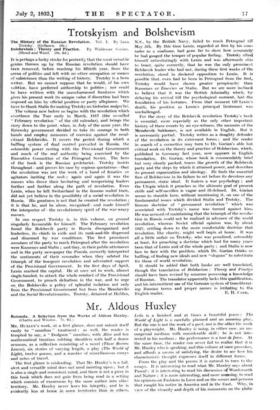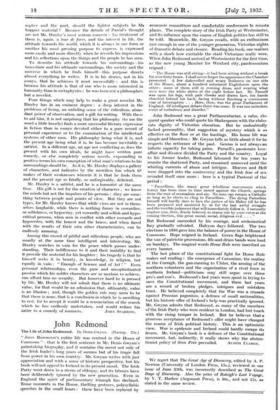Mr. Aldous Huxley
Rotunda. A Selection from the Works of Aldous Huxley.
(Chatto and Windus. is. 6d.)
MR. HUXLEY'S work, at a first glance, does not submit itself easily to " omnibus " treatment : as well, the reader is tempted to say, a Dodgson " omnibus, with Alice and ten mathematical treatises rubbing shoulders with half a dozen sermons, as a collection consisting of a novel (Those Barren Leaves), six stories of varying length, a play (The World of Light), twelve poems, and a number of miscellaneous essays and notes of travel.
The first glance is misleading. That Mr. Huxley's is a full, alert and versatile mind does not need insisting upon ; but it is also a single and consistent mind, and there is not a piece in this book which does not gain from being read in a setting which consists of excursions by the same author into other territory. Mr. Huxley never loses- his integrity, and he is pvidently less at home in. some territories than in others.
Leda is a finished and at times a beautiful poem ; The World of Light is a carefully planned and an amusing play. But the one is not the work of a poet, nor is the other the work of a playwright. Mr. Huxley is using, in either case, an un- congenial medium with considerable skill ; he is not inte- rested in his medium ; the performance is a tour de force. At the same time, the reader can never fail to realize that it is Mr. Huxley who is speaking, and this volume at once provokes, and affords a means of satisfying, the desire to see how his characteristic thought expresses itself in different forms.
From the play and the poems it is natural to turn to the essays. It is interesting to read what Mr. Huxley says about Pascal ; it is interesting to read his discussion of Wordsworth and Nature ; it is more interesting, and more amusing, to read his opinions on Fashions in Love and on the scenes and persons that caught his notice in America and in the East. Why, in view of the vivacity and depth of his comments on the philo. sopher and the poet, should the lighter subjects be his happier material ? Because the details of Pascal's thought are not Mr. Huxley's most serious concern : his treatment of them is, again, a tour de force, and the interest in life, the attitude towards the world, which it is always in one form or another his most pressing purpose to express, is expressed more easily and more directly when he records his impressions and his reflections upon the things and the people he has seen. To describe his attitude towards his surroundings—his Immediate and his ultimate surroundings, the society and the universe in which he finds himself—this purpose directs almost everything he writes. It is in his stories, not in his essays, that he achieves it most successfully ; and this is because his attitude is that of one who is more interested in humanity than in metaphysics ; he was born not a philosopher, but a novelist.
Four things which may help to make a great novelist Mr. Huxley has in an eminent degree : a deep interest in the problems of living, an unfailing sense of the ridiculous, abun- dant power of observation, and a gift for writing. With these to aid him, it is not surprising that his philosophy (to use the word a little loosely) finds a more successful literary expression in fiction than in essays devoted either to a pure record of personal experience or to the examination of the intellectual systems of other men. His philosophy being what it is, and the present age being what it is, he has become inevitably a satirist. In a different age, an age not conflicting as does the present with his own ideals, he might have written pure comedy, or else completely serious novels, expounding in positive terms his own conception of what man's relations to his surroundings should be. As it is, Mr. Huxley displays a gallery of characters, and indicates by the merciless fun which he makes of their weaknesses wherein it is that he finds them and the present age so fatally, so unforgivably, deficient.
Mr. Huxley is a satirist, and he is a humorist at the same time. His gift is not for the creation of character ; we know the minds but not the impulses of his persons : they are some- thing between people and points of view. But they are not types, for Mr. Huxley knows that while vices are not in them- selves laughable, while there is nothing funny in cowardice, or selfishness, or hypocrisy, yet cowardly and selfish and hypo- critical persons, when seen in conflict with other cowards and hypocrites, with the honest and the brave, and when faced with the results of their own other characteristics, can be endlessly amusing.
Among this crowd of pitiful and ridiculous people. who are usually at the same time intelligent and interesting, Mr. Huxley searches in vain for the peace which passes under- standing. Their indifference to it and their inability to find it provide the material for his laughter ; his tragedy is that he himself seeks it in beauty, in knowledge, in religion, but equally in vain : "Enough of Science and of Art!" Even personal relationships, even the pure and unsophisticated passion which his nobler characters are so anxious to achieve, can afford him no security. But however hard he is pressed by life, Mr. Huxley will not admit that there is no ultimate value, for that would be an admission that, ultimately, value is an illusion ; and, though the golden rule may seem to be that there is none, that is a conclusion in which he is unwilling to rest, for to accept it would be a renunciation of the search which he has endlessly undertaken, and would reduce his







































 Previous page
Previous page